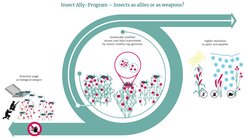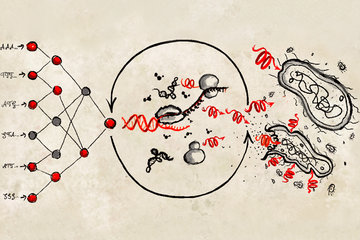'Viruses can change an entire population in a very short time'
Interview with Guy Reeves on the release of genetically modified organisms into nature
With its annual report "Environment Frontiers", the United Nations Environment Programme (UNEP) shows which challenges will have a decisive influence on the natural foundations of life on our planet in the future. In their report 2018/2019, the authors call "Synthetic Biology: Redesigning our Environment" one of the great challenges of the future. In this field of research, scientists are changing the genetic make-up of organisms, thereby confering properties to them that are useful for humans.

How do you assess the different technologies in which scientists or companies want to release genetically modified organisms?
I am particularly concerned about the development of infectious genetically modified viruses intended to manipulate the immune systems of mammals when they are released into the environment. Genetically modified viruses of this kind have already been developed to make mammals immune to diseases or to sterilise them. A genetically modified virus that spreads in wild rabbit populations to make then immune to two diseases was tested in 2000 on the Spanish Balearic Islands. Another virus intended to sterilise mice has reportedly been ready for field trials in Australia since 2003. Another example is a research program that is currently underway at the U.S. Department of Defense's research agency DARPA, in which insects are used to transfer genetically modified viruses to corn and tomato plants. Currently experiments are limited to secure greenhouses.
While laboratory and hospital contained viral methods are already bringing enormous benefits to patients and scientists, proposals that seek to intentionally disperse genetically modified viruses into the environment require very careful scrutiny. Unfortunately, there is general agreement that globally we have not yet worked how best to do this, despite the already extensive development of these techniques.
Why are viruses so problematic?
Few other biological systems can have such a rapid effect on a complete population. This can happen within a single generation. In comparison, the much-discussed gene drive is much slower. Moreover, it can be difficult to predict with confidence what species particular viruses are able to infect as their known host ranges are in many instances quite flexible.
Do you reject the release of genetically modified organisms in any case if they are not agricultural crops?

Not at all. It is not a question of preventing new technologies. But we have to be careful and weigh the potential benefits against the risks. I therefore believe that especially the release of infectious genetically modified organisms should only occur after very careful consideration. Equally, if there are existing alternatives techniques that could achieve the same aims, in most circumstances it may not make sense to use viral methods whose risks will be difficult to control.
You have already mentioned the so-called gene drive. This enables a gene to spread much faster than normal. A gene for infertility is supposed to eradicate mosquitoes within a short time and thus prevent the transmission of malaria. What is wrong with eradicating mosquitoes?
Gene drive, as I said, is not as fast as many people think. Even in an animal with such a short generation time as a mosquito, it would probably take eight years or longer for a gene drive to cause sterility in a target population even under ideal conditions. In addition, our experience with insecticides has taught us how insects can adapt quickly when the selection pressure is high enough. And resistance to an infertility gene is like the first prize in a lottery.
Consequently mosquitoes are therefore unlikely to be made extinct in this way and I would always bet on the capacity of large insect populations to evolve to break this type of gene drive.
Are the current laws regulating such experiments sufficient?
The challenge facing regulators is enormous. They have to consider incredibly complex mathematical models - a task that is already difficult for well-equipped authorities in developed countries. However, many of the planned projects will involve emerging economies that are not at all equipped for the task. And, of course, viruses and insects do not generally respect international borders.













